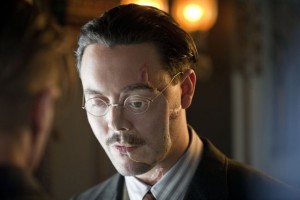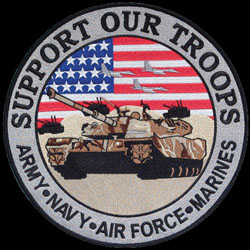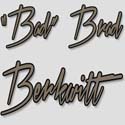He died beneath the boardwalk, looking with his one working eye toward the Atlantic, maybe at the clusters of stars with which little Tommy had recently become so infatuated, ushered peacefully away from his fleshly existence to the rhythmic recurrence of the ocean waves crashing and receding.
Not only was there a deficiency of ill will on the part of Jack Huston directed toward the creative team behind “Boardwalk Empire” for killing off his character who, for what it’s worth, transcended a simple three-episode story-arc playing a bizarre ancillary role to become a pivotal and memorable four season fan favorite, but the grateful actor wept at the poetic nature of Richard Harrow’s mortal demise in “Farewell Daddy Blues”, the finale of the show’s penultimate season.
In order to rescue little Tommy Darmody from the corrosive environment of Gillian’s Artemis Club, Richard swept through the whorehouse’s every floor, systematically dispatching close to a dozen henchmen in the employ of the unpredictably maniacal Gyp Rosetti who were lying in wait to assassinate Nucky Thompson, who arrives with brother Eli expecting a gunfight but instead bearing horrific, if fortuitous, witness to the subsequent carnage of Harrow’s one-man massacre.
Discovering Tommy in one of the brothel’s upstairs bedrooms with one of Rosetti’s goons holding a gun to the boy’s head, Richard maneuvers as if to obediently rest his rifle on the floor as instructed before telling Tommy to close his eyes. With one arm, from an awkward crouching position at ground level, Richard puts a single bullet through the man’s skull, splattering Tommy in an awful mess of blood, brains, and bone. They arrive streaked with gore in the dead of night at the house of Richard’s love Julia Sagorsky and her father-his friend and fellow veteran Paul, he of the American and Philippine War. Harrow wordlessly transfers Tommy to the arms of a dumbstruck Julia and walks off into the darkness.
The opening scene of season four reveals Richard’s whereabouts to be in the Midwest, specifically Illinois, as he disables the automobile of two patrons of a roadside restaurant to lure them out, one at a time, into the swirling winter storm, where he cuts the throat of the first, puts a bullet between the eyes of his companion, and backs away slowly, eerily dissolving into the snow squalls. Harrow had removed a packet from the jacket pocket of his second victim, the address on which will presumably lead him to the next unfortunate soul to suffer the consequences of Richard’s having entered into an agreement with a neighboring train passenger, somewhere along the line out of New Jersey, to carry out a series of independent contract killings on behalf of this progenitor of some scheme gone wrong.
The episode closes with Richard tentatively approaching a farmhouse, his disfigured facial landscape a warzone of nerves and muscles which wrestle with one another beneath the already desecrated cartilage as he screws up the courage to knock on the door, but not before concealing his pistol in the adjacent firewood pile on the front porch. Harrow is regarded from behind his back not only by an inquisitive pair of eyes but the double barrels of a raised shotgun, and when homesteader and interloper finally face one another, the firearm is lowered and Richard says to his estranged sister, “Emma, I’ve come home.”
The summary of Emma’s recent past sounds like the verse to a blues song. “Orphaned in April, married in May, pregnant in August, widowed in November”, as she disarmingly brings Richard up to speed. Even the Harrow family dog Sampson is missing in action. When he lies about having read the books she had sent him, Emma presents him with a copy of Edgar Rice Burrough’s “Chessmen of Mars”, tucked inside of which Richard unfolds a past due notice from the Plover County Assessor in the amount of $1,234.80 for back taxes.
The Burroughs book is next seen on the tabletop of Harrow’s next intended victim, who enters his office to find a gun in his face. Richard slams the man’s hand in his desk drawer from where he attempts to retrieve a revolver and rebuffs his desperate attempt at a buyoff for his life. The man tells Richard that he has a wife and two kids to which Harrow responds, as he withdraws the gun and picks up the book, “When you see your children tonight, remember it didn’t cost you anything,” and exits.
His business unfinished, Richard returns to the farm where Emma has discovered Sampson lying in the shade of the barn, unresponsive, breathing shallow and irregular. She is holding a shotgun but asks Richard to deliver the merciful coup de grace with the pistol she saw him hide in the stack of logs but wants to know no more about. He removes it from his coat and holds it just below his old friend’s pointed ears but staggers away to the sound of Emma’s rifle discharging its brand of brutal compassion. Tears flow from Richard’s one good eye as he succinctly unburdens the confusion of emotions to his sister in his halting, razor-wire utterances, “Emma, I don’t want any more of this.” Literally burying his violent past, Richard digs a hole in the yard and into it goes his gun, his guilt, his grief and shame.
Harrow left behind more than a living, breathing man back in that office. Carelessly forgotten was Emma’s tax notification, slipped from within “Chessmen of Mars” and found by the man who had to do Richard’s dirty work by bloodying his own hands in the execution of his own enemy and is now eager to know why Harrow has failed to fulfill his murderous obligation. He and an accomplice find Richard cleaning the barn and lost in the nostalgia of keepsakes from his youth. Able to fend off the gunman by twisting a knife into his guts, the bones of his hand are snapped like matchsticks under the heel of his employer with whom he is in breach of contract as he reaches for the fallen weapon. Richard’s mask has come undone in the struggle and the would-be murderer holding the gun to Harrow’s wretched face mockingly suggests that he is doing him a favor. The bloodstain which blossoms on Richard’s face originates not from him, but from the explosion of flesh and bone from above, courtesy of Emma who twice now has had to come to her fragile brother’s rescue.
“In France, when I couldn’t sleep, when I was full of fear, I’d think about the day I’d come home”, Richard wistfully recalls to Emma before he is driven to the train station by the well-intentioned suitor who has been awkwardly attempting to win his sister’s favor, initiating an eventual return to Julia and Tommy back in New Jersey. “I’d be in my dress uniform. I’d have medals. I wouldn’t wear them but I’d have them. I’d see the yard, cornflowers along the fence, the porch, the old flag, mother, father, Sampson…you.”
As if his sentimental reminiscence is too much for her to bear, Emma silences her brother with a hug and these profound parting words, “Richard, you need to call yourself to account.”
Not until halfway through the season does Richard reappear, at a VA hospital to have the progress of his healing hand examined and where he encounters Julia’s father Paul who has just been informed that he is dying from cirrhosis of the liver due to his decades of unrepentantly heavy drinking, making it abundantly clear to Richard that it is only a matter of time until he will have to assume the patriarchal role for the sake of Julia and Tommy. After Paul clarifies that both he and Julia are aware of the homicidal circumstances behind Tommy’s liberation and that he considers Richard’s actions heroic, Harrow reluctantly admits, “I’ve done other things” and when Sagorsky asks how many, Harrow’s heavy-hearted yet matter-of-fact response is “I’ve stopped counting.”
Forgiveness and acceptance are not so easy for Julia, embroiled in a custodial war over guardianship of Tommy with Gillian, who is fighting and losing a secret battle of her own with heroin. Richard and Julia begin the hesitant but inevitable mating ritual all over again by taking Tommy for a moonlit stroll on the pier so that the youngster can use his hand-held telescope to identify the constellations in the night sky for the benefit of these star-crossed lovers. Before too long, Julia admits to Richard, while using witty sarcasm as an emotional self-defense mechanism, that the court would be more inclined to grant custody of Tommy to a stably married woman, adding “I guess you’ll do in a pinch.”
Sitting together but each very nervous on a bench outside of the office of the Atlantic City Justice of the Peace, Richard eradicates Julia’s impatience with an uncharacteristic joke. “After all,” he growls, “it’s just a hunting license.”
Chalky White, interestingly enough based not on a real-life gangster but rather inspired by featherweight boxer Albert “Chalky” Wright and portrayed by the great Michael Kenneth Williams (best known, before this, as Omar from “The Wire”), has assumed a rare position of power and prestige for a black man in the 1920s, owner and operator of the Onyx Club on the prime real estate of the boardwalk, even if beholden to benefactor and silent partner Nucky Thompson. His feud with newcomer Valentin Narcisse (a disquietingly devilish Jeffrey Wright), a fictional (though, it has been suggested, influenced by W.E.B .Dubois) peer of radical black nationalist Marcus Garvey, with a predilection toward referring to African Americans as “Libyans” and an affectation by way of his insistence on the recognition of his title Doctor, was the most intriguing storyline of “Boardwalk Empire’s” fourth season, not to mention one with grave consequences for our man Richard Harrow.
Materializing from the shadows along the shoreline of the beachfront Albatross hotel to appear before Nucky, who has been holed up there since the attempts on his life by the gangs of both Gyp Rosetti and Joe Masseria, newly wed Richard comes to Steve Buscemi’s Thompson with hat in hand, asking for a job. No longer a hitman for hire, Harrow is put to work in the kitchen of Chalky’s Onyx Club. Stepping outside to empty the trash one afternoon, Richard inadvertently interrupts a back alley rallying of the troops by Chalky in preparation for a sneak attack on Narcisse. The white man’s intrusion is mollified by Chalky, who insists to his co-conspirators that not only is he of the belief that every man is entitled to the right to earn a living, but that he and Harrow are friends as the two shake hands beneath fight posters alongside an advertisement for a dramatic staging of “Uncle Tom’s Cabin”. Richard tends to Chalky in an abandoned Veterans Affairs warehouse after he is shot by Narcisse during White’s failed assassination attempt of the (not so) good doctor.
When Gillian is coerced into giving a murder confession to a Pinkerton detective played by Ron Livingston from “Office Space”, Richard is among the witnesses called to testify during the trial that the body supposedly burned in the casket of Jimmy Darmody was not his. Indeed, the cremains were of a boy named Roger that Gillian had seduced due to his uncanny resemblance to Jimmy, and injected with a lethal fix of heroin in her bathtub. All of this was because a body needed to be attributed to Jimmy in order for custody of Tommy to be bestowed upon her as the boy’s grandmother. Until, of course, her reputation as a junk addict, proprietor of a whorehouse, and alleged murderess come to light and threaten to burst the bubble of fantasy and delusion inside of which she had long been existing.
As Jimmy Darmody’s actual killer, Nucky Thompson alone knows the grim truth of the whereabouts of the body of Richard’s old friend, and it is to him that Harrow turns, beseeching the cold, hard facts, knowing full well that the unearthing of Jimmy’s corpse will send Gillian away for life. Not only hers, but his, Julia’s, Tommy’s. While not verbally implicating himself, Nucky inquires of Richard what he may do in return for the assistance of an anonymous source, to which Harrow informs the anonymous source himself that “I would do whatever you asked.” It should go without saying that it is certainly not peeling potatoes or washing dishes in the Onyx Club that Nucky has in mind for Harrow this time around.
For all of his florid vocabulary and immaculate suits designed for posturing as the intellectual leader of the local chapter of the Universal Negro Improvement Association concerning the scourge of heroin upon the black community, Valentin Narcisse is at one and the same time the primary source for the powdered plague which he is spreading throughout Atlantic City with the help of Arnold Rothstein, the real-life gangster and gambler best known for facilitating the infamous Black Sox World Series scandal of 1919. Under the guise of striking a Faustian bargain with Narcisse, Nucky agrees to lure Chalky White out of hiding with the promise of safe passage to his daughter Maybelle’s wedding and serve him up for a hit during a meeting at the Onyx Club in exchange for Thompson’s being cut in on a one-third share of the heroin traffic currently generated by Rothstein and Narcisse. And so it is a done deal, or such is the misapprehension under which the ambitious and duplicitous man of letters leaves believing to be the reality.
Richard, meanwhile, is putting Tommy, Julia, and Paul on a Wisconsin-bound train with the promise of joining them on Emma’s farm in three days’ time. After telling Tommy to count the cows he sees along the way and that he expects a full report of his findings when he sees him next, Richard kneels down and pulls Tommy into a tight embrace, whispering “I love you” into the boy’s ear before Paul leads him off to a concession stand to buy a pack of Chuckles to enjoy during the trip. An intuitive Julia wants to know whether that was intended as some kind of goodbye and Harrow answers only with a kiss.
Seated across from one another during a performance at the Onyx Club, Chalky gloats over the fact that he alone knows the whereabouts of Daughter Maitland, with whom White has been carrying on an affair and has been in Narcisse’s care from infancy since he evidently murdered her prostitute mother, leading one to jump to the conclusion that he may also very well be the girl’s biological if illegitimate father. In turn, Valentin insures Chalky that neither he nor his men will make it out alive past the alleyway. Furthermore, he produces Chalky’s daughter Maybelle from a private entrance, proposing a mutually beneficial swap of “one daughter for another”.
It is when we see Richard in an upstairs doorway holding Narcisse dead-center in the crosshairs of his rifle’s scope that the malefic complexities of the intricate arrangement between Nucky, Chalky, Narcisse, and Harrow comes into full and terrible focus. But, his appetite for killing gone, Richard hesitates for a few fateful moments, coils and unsprings the atrophied muscles of his injured shooting hand several times with special attention given to his trigger finger, removes his cap, regains his composure, takes aim once again, and fires. At this precise instant, Maybelle has been ushered into the kill zone and directly in front of Narcisse and his uncomprehending face is splashed with her blood as her lifeless form slumps over the table between her father and his nemesis. Stricken by the horror he has wrought, Richard is frozen in place long enough to sustain a gut-shot from one of Narcisse’s men in the beginning stages of the ensuing pandemonium, during which he makes his escape past paying customers, responding police officers, and panic-stricken showgirls.
We lose sight of Harrow for the duration of Daughter performing Ma Rainey’s “Farewell Daddy Blues” in a small jazz club over a montage depicting where the shows other major player’s find themselves at the conclusion of the season finale. Gillian Darmody in prison, Chalky White in exile at the home of his murdered mentor, Valentin Narcisse forced into informing on Marcus Garvey for J. Edgar Hoover’s newly formed Bureau of Investigation, Nucky Thompson seated uneasily at the throne of a crumbling kingdom.
Richard Harrow looks out the window of a moving train whose destination there is no doubt about. The sun shines and birds sing as he walks the final distance along the railroad tracks. The Harrow farmhouse looms just ahead and, from Richard’s vantage point, we see his extended family awaiting his arrival on the front porch. Emma, her new husband at her side and their baby in her arms. Julia, Tommy, and Paul. The camera reverses its angle and we now see Richard seeing them. Julia alone steps forward, the others seemingly captured in a somehow unsettlingly still backdrop, moving down the walkway toward Richard. Her step hastens in anticipation. Again we look directly at Richard, his face broken open not by a mortar shell but by a smile, made whole again as it was before the war, before killing for gain, before being befriended and sketched by Angela, before avenging her murder, before walking the world alone, before breaking his sister’s heart, before abandoning the woman he loved and the boy he freed from a whorehouse.
Dawn breaks on Atlantic City, revealing Richard’s mask lying in the sand beside one bloody outstretched hand, the other clutching his stomach, holding his insides where they belong even if it is now a moot point. As he was on the approach to the Harrow homestead in his dying vision, he is smiling now beneath the Atlantic City boardwalk.
As above, so below.
[si-contact-form form=’2′]

 December 10th, 2015
December 10th, 2015  CEO
CEO 
 Posted in
Posted in  Tags:
Tags: 



